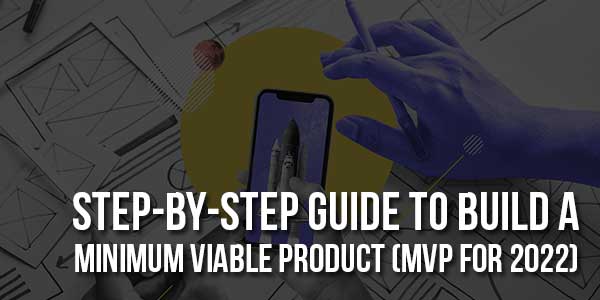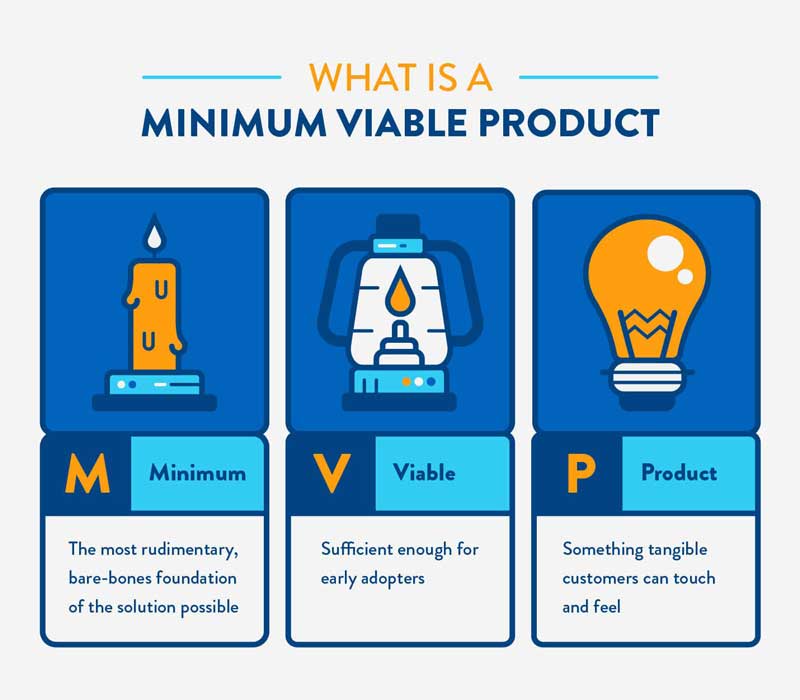
If you’re reading this post, you’re presumably questioning whether MVP app development is the best fit for your situation. Before we get into the meat of the discussion, ask yourself a quick question: What do Amazon, Facebook, and Uber all have in common, and how do they differ from each other?
A successful MVP is one of your first steps in running a successful business, but you should take this step carefully. It is important not to overestimate your budget and avoid hiring pricey developers from the start. Take this straightforward advice and create a product that clients will genuinely like and appreciate.
Table of Contents
What Is An MVP (Minimum Viable Product)?
An MVP (minimum viable product) is a minimal, ready-to-launch product version that includes only the most essential elements (which define its value proposition). A minimum viable product (MVP) is produced to decrease time to market, attract early adopters, and establish product-market fit from the beginning of the development process.
After the launch, the first round of feedback is expected to be received shortly after. Examine the received feedback, resolve issues, and improve the product features.
Why Create An MVP?
The primary objective of developing an MVP is to create a workable product that gives instant value quickly while keeping expenditures to a minimum. Making a minimum viable product (MVP) will help you learn more about your end-user and the industry you intend to break into while testing your assumptions.
Whether you’re searching for backing from internal or external investors, a minimum viable product (MVP) will undoubtedly boost your position because it will demonstrate the value of your product and help you gain money for further product development.
As a bonus, an MVP will provide the basis for future development iterations and describe the sequential actions that must be followed in the project – whether that means completely changing directions or continuing down the previously stated development path. In rare cases, an MVP may also be used to demonstrate commercial potential and garner support from stakeholders and investors.
We’ll go through the stages needed in generating an MVP in depth below, and we’ll go over what happens at each level as well.
Minimum Viable Product Development Stages:
When developing an MVP application, you often have limited time and resources. Number one on your list of priorities is finding the quickest route from development to market for your application. However, different processes must be completed before a genuine minimal viable product may be released. Pay attention to the following:
Step 1.) Begin By Doing Market Research:
At times, ideas will not meet the market’s demands. A company must confirm that their concept and the process of developing an MVP meet the needs of their target consumers before moving forward with either.
To avoid this, undertake proper market research and better understand our idea, target market, and customers.
Finally, the greater knowledge a company has, the greater its chances of success. Also, remember to keep an eye on what the competition is giving and how the product concept might differentiate itself from the crowd.
According to the results of a survey done by CB Insights, the most common cause for a startup’s failure was a ‘lack of market necessity.’ Briefly stated, consumers will not cooperate in finding a solution if the product fails to address the problem at the source.
Step 2.) Target Real-Life Problems:
Your first steps set the tone for the rest of your company’s journey. An idea may appear brilliant, and you may want to start working on it right away. However, there is a risk of concluding such an idea if no one genuinely needs it.
If you want to lessen the likelihood of failure, your first step should be to identify an existing need that your app will answer. Solutions to real-world problems are more likely to be adopted by many people.
Step 3.) Ideate On Value Addition:
What is the added value that the new product provides to its customers? What is the advantage to them? What would compel them to purchase the product? The answers to these questions can aid in the definition of the app’s value proposition (or its unique selling proposition).
As the term MVP suggests, the product must provide value to the user in its most basic form. It should also be quite obvious what the essential estimations for the product are. Begin by sketching out the demands of your users, and then create your MVP around those needs.

Step 4.) Diagram The User Flow:
The design phase is a critical stage in the MVP development process. The app should be designed in a way that is convenient for users. The company must consider the app from the user’s point of view, from the moment the app is launched through the completion of the end process, such as making purchases or delivering a package.
The user flow is another critical consideration since it guarantees that nothing is forgotten while maintaining user happiness in mind at all times.
It is required to establish the process steps before it is possible to define the user flow. It is necessary to outline the stages that must be taken to achieve the primary goal. Instead of focusing on features, the emphasis should be placed on fundamental operations such as identifying and purchasing a product or handling and receiving orders.
These are the objectives that end-users will want to achieve when interacting with the product. As soon as each of these method steps has been clearly defined, it is essential to specify the specific characteristics of each stage.
Step 5.) Prioritize MVP Features:
Prioritise all of the features that the MVP will support at this point. Consider the following questions while prioritising MVP features: What do people want? What do you want? Is this product able to provide them with something of value? Etc.
The following step prioritises all remaining MVP features into three categories: high priority, medium priority, and low priority. Another critical step is to prioritise these items and include them in the product backlog (priority-wise). It is now time to start working on creating an MVP. Businesses can even construct an MVP’s prototype if they want to preview how their future product will appear before committing to it.
Fun fact: “While developing the Apple Lisa, Steve Jobs was fired because he refused to go through the prototype steps of the process. The outcome was a disaster, as the company failed to generate good sales.”.
Step 6.) Build An MVP:
Once the essential characteristics have been identified, it is time to put them into action and begin building the product.
Forget about striving for perfection! At this point, your sole concern is getting the application out into the wild in the shortest amount of time feasible so that you can test assumptions with the least amount of risk.
The sooner your real users begin to utilise your product, the better off you will be. Their response will demonstrate whether they want this software or a waste of time and money.
Remember that if people enjoy your minimal viable product, despite its flaws, they will be much more enthusiastic about the complete version of the program when it is released.
Step 7.) Learn And Improve Your MVP:
Everything is a step in a more extensive process: First, determine the scope of the task, and then move the product to the development stage. The initial testing stage is carried out by Quality Assurance engineers, who are concerned with improving the quality of the product (even if the product has not yet been launched). After product development, the product must be put through its paces.
Following the launch of the MVP, thoroughly review everything. In other words, the company must gather information on its clients’ reactions to the release. As a result of their comments, they may assess whether or not their product is acceptable and competitive in the marketplace.
Conclusion:
Going into your first MVP Development project should not be as daunting as before. Keep in mind that it does not have to be flawless! To create an MVP for the product, follow the procedures and methods outlined in this document.
It is important to note that an MVP method allows companies to learn a great deal about their customers via the usage of a functional product without spending a ton of time and money developing the product.
Find the right developers for your MVP development, layout a proper marketing strategy, analyse the feedback and improve your MVP. Lay the cornerstone for your multi-billion dollar company.

 About the Author:
About the Author:















Be the first to write a comment.